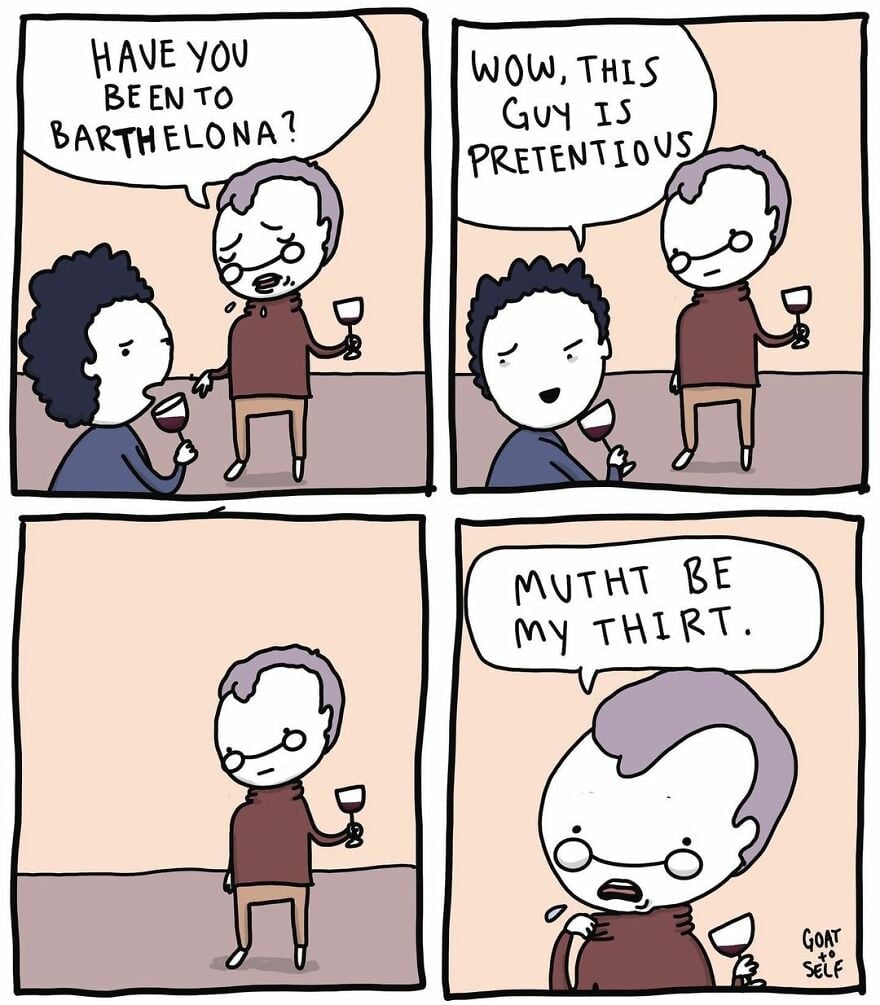Barcelona
-
That would be the (standard) Spanish, right? Catalan, the local language, has it with /s/
But it's very language-dependent. English has established names for many places, so you should probably use those. But some languages just don't, and if you borrow everything, you might as well borrow properly.
-
[email protected]replied to [email protected] last edited by
Sure, but as a general rule, if you're trying to decide how to say the name of a place, you should say it as it is said in your language/dialect if you're speaking your language/dialect, and especially if you're speaking your language/dialect with another person who speaks the same language/dialect.
-
[email protected]replied to [email protected] last edited by
When I mispronounce words I’ve been giggled at and/or corrected
By whom?
When I pronounce it right
What do you mean by "right"? "Barcelona" with an "s" sound is right.
-
[email protected]replied to [email protected] last edited by
If I say Barcelona with a lisp, or without, 99.9999% of people that know what Barcelona is will understand me, you're being unnecessarily pedantic. Anyone who seeks to control language should talk to a linguist. Language isn't prescriptivist as much as non linguists like to think so. It is fluid and ever changing. People will choose how they want to speak and it will either work or it won't. If people understand what someone is saying, nothing else matters as much as many like to think.
-
[email protected]replied to [email protected] last edited by
When Spain invaded Latinamerica, they recorded the language of the natives phonetically but there were a lot of sounds that didn't have an Spanish equivalent so they just wrote X for all of them and now they're trying to retroactively fix the spelling of several words so you're kinda right. For example, Spain insists México is spelled Méjico.
-
[email protected]replied to [email protected] last edited by
Una thervetha por favor!
-
Im bilingual and speak 4 languages and i like it when people pronounce names correctly. Especially in hungarian which a lot of people pronounce incorrectly, it feels nice. Then again i could be alone but other peoples comment suggest otherwise. I just dont know why you reacted so offensively to my comment. Btw a language not having the correct sounds doesnt mean you dont hear/know them. Im really bad with the scratchy sounds in french, danish, arabic, etc but i still hear them so i recognise what is being said.
-
[email protected]replied to [email protected] last edited by
Well that's awkward. My brain seems to have "autocorrected" Castilian to Catalan. I literally didn't notice until I reread it just now. My bad.
-
[email protected]replied to [email protected] last edited by
How do the people around you pronounce it? I don't think I'd understand it if it were pronounced differently
-
[email protected]replied to CarrotsHaveEars last edited by
The one that keeps surprising me over and over again is Karyohkey instead of Ka-ra-o-ke
-
[email protected]replied to [email protected] last edited by
Here in Switzerland we have four languages and we simply say words like they sound in the language they are from, even if most of us only speak one of the languages natively and one as a second language from school. There is no reason to make up separate pronunciations. Buillon is buillon and Tiramisu is Tiramisu even if I'm speaking Swiss German.
-
There is an urban legend that everyone in Spain started speaking this way because of the super-inbred Habsburg kings had a terrible lisp and everyone wanted to make him sound normal. There's no evidence of it, but considering this guy was king of Spain...

-
[email protected]replied to [email protected] last edited by
Switzerland is a tiny country, so it's no surprise that certain words are standardized.
-
i like it when people pronounce names correctly
How do you define "correctly"? Is "Munich" a correct way to pronounce that city in Germany, or is only Munchen acceptable? Or should it be "Minga" because that's how it's said in Bavarian?
-
[email protected]replied to [email protected] last edited by
Yes, Barcelona is a place that people have heard enough of the two versions to know the "strange" version that isn't natural to their language. But, what about Zaragoza? I doubt most English speakers would understand what you meant if you dropped the Castillian version of that into a sentence when speaking English.
Language isn’t prescriptivist
Of course not, that's why the names of places in English don't sound like the names used locally. If it were prescriptivist there would be no Munich, only Munchen. No Prague only Praha, no Geneva, only Genève. Only someone who doesn't understand how languages work would think that it's appropriate to say "Barcelona" with a "th" sound when speaking English.
-
Fushuan [he/him]replied to [email protected] last edited by
The english Th sounds different from the spanish C. Source: spaniard.
It's similar though.
-
Fushuan [he/him]replied to [email protected] last edited by
For me is a matter of respect, I try to pronounce place names just as I try to pronounce names. If I say them wrong I feel like I'm disrespecting the locals.
If that makes me pretentious I'll be a petty bitch and mispronounce the names of the ones calling me so. Bastards.
-
Fushuan [he/him]replied to [email protected] last edited by
Trilingual here, if it's clear that someone is trying to say it correctly (as would be said by anyone of the native language) even if they mispronounce it they get a pass.
If you come to my city and call it Saint Sebastien you are going to get very weird looks. If you call it San Sebastian or even better, Donostia, even mispronounced most local will smile because you are fucking trying.
Yes there are some phonemes that don't exist in other languages but it's clear when outsiders say them wrong while trying vs wrong and they don't bother to make a similar sound. It's about respect.
I would say Munchen since its how my German friends told me that should be said.
-
[email protected]replied to [email protected] last edited by
You said of course not and then ended with a prescriptivist point of view, you're lost mate.

